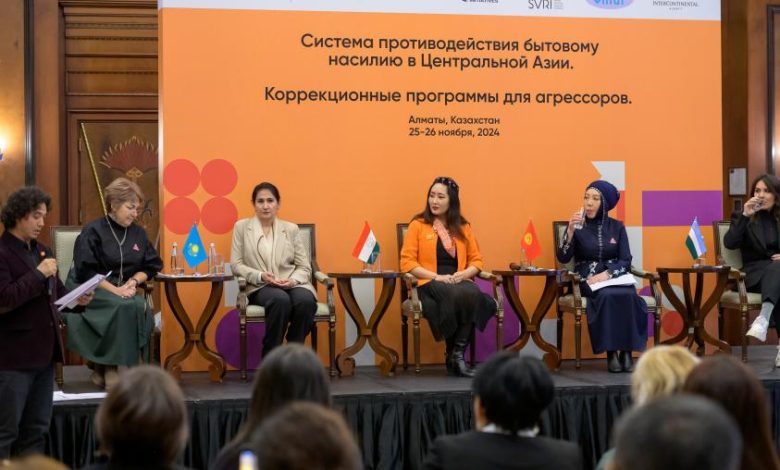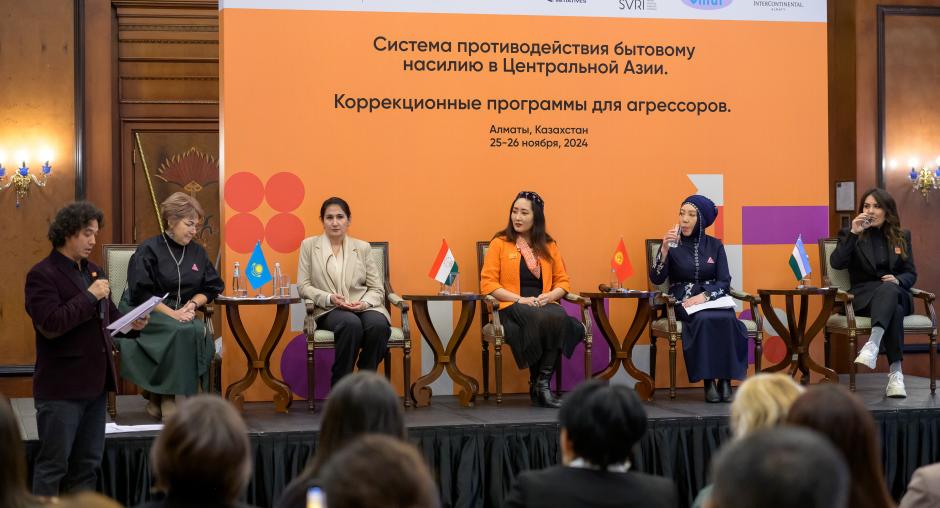Central Asia Unites to Combat Domestic Violence at FES Conference

ASTANA — The Friedrich Ebert Foundation (FES) in Kazakhstan hosted the Central Asian Conference on combating domestic violence, focusing on systemic measures to protect women and children. Held in Almaty as part of the global 16 Days of Activism Against Gender-Based Violence campaign, the event brought together representatives from Kazakhstan, the Kyrgyz Republic, Uzbekistan, and Tajikistan to share experiences and discuss collaborative strategies.

Press panel at the regional conference on combating domestic violence in Central Asia, featuring representatives from Kazakhstan, Tajikistan, the Kyrgyz Republic and Uzbekistan on Nov 25. in Almaty. Photo credit: OSCE / Vlad Semyonov
The conference, titled The System of Countering Domestic Violence in Central Asia: Correctional Programs for Aggressors, was co-organized by the FES Representative Office, the Union of Crisis Centers, and the Organization for Security and Co-operation in Europe (OSCE) Program Office in Astana.
According to the FES press service, the conference program featured sessions on legislative measures, law enforcement practices, IT solutions for protecting victims of violence and discussions on the media’s role in raising public awareness. Over 80 participants, including parliamentarians, law enforcement officials, health professionals, non-government organizations (NGO) representatives and international experts, attended to strengthen cross-border cooperation in addressing domestic violence.
Correctional programs as a regional priority
Correctional programs for aggressors emerged as a focal point of the conference. Studies cited during the sessions revealed that such interventions have led to significant behavioral changes. A German study showed complete cessation of violence among participants from eight to nine months after completing the program.

The System of Countering Domestic Violence in Central Asia: Correctional Programs for Aggressors. Photo credit: FES Kazakhstan Instagram page
Alima Tenizbai, Project Manager of the Ebert Foundation Representative Office in Kazakhstan, noted that the systemic fight against violence requires addressing not only its consequences but also its root causes.
“At the moment, most efforts are focused on supporting victims, while it is also important to work with aggressors. Violence is a problem that affects both sides: the victims and those who commit it. Thus, correctional programs for aggressors are a tool preventing relapses,” said Tenizbai.
Progress across Central Asia
The conference underscored significant progress in addressing domestic violence across Central Asia, with each country contributing unique measures to the regional effort.
In Kazakhstan, the Ministry of Internal Affairs began piloting the ODARA risk assessment tool in August 2023. This tool helps police evaluate the likelihood of repeated domestic violence incidents, and research conducted by the Zertteu Research Institute revealed that 83% of inspectors regularly use it. Additionally, 73% of respondents confirmed its effectiveness in predicting violent behavior. In April this year, Kazakhstan took further steps by criminalizing domestic violence, introducing legal penalties for offenses ranging from minor to severe harm.

Participants of the FES-organized conference marks a significant step toward a unified regional approach to eradicating domestic violence. Photo credit: FES Kazakhstan Instagram page
Similarly, Uzbekistan criminalized domestic violence in April 2023. Beginning in January 2025, Uzbekistan will maintain a registry of aggressors, who will be required to undergo corrective programs aimed at altering violent behaviors.
In Tajikistan, recent amendments to domestic violence prevention laws include the creation of an interdepartmental council to enhance coordination and effectiveness in combating violence. This council is designed to streamline systemic work across various government bodies and stakeholders.
Meanwhile, the Kyrgyz Republic, which became the first Central Asian nation to criminalize domestic violence in 2017, has continued to strengthen its efforts. In August 2023, President Sadyr Zhaparov approved amendments to domestic violence legislation. These changes include mandatory correctional programs for aggressors, which will be implemented by the Probation Department and the Penitentiary Service under the Ministry of Justice.
A unified regional approach
The conference concluded with a resolution recommending enhanced measures to combat domestic violence, emphasizing the importance of regional cooperation and shared expertise.
“The Conference confirmed that combining the efforts of all structures is a key factor in reducing the level of aggression against women and girls. This conference marks a significant step toward a unified regional approach to eradicating domestic violence,” said Zulfiya Baysakova, Director of the Union of Crisis Centers.





